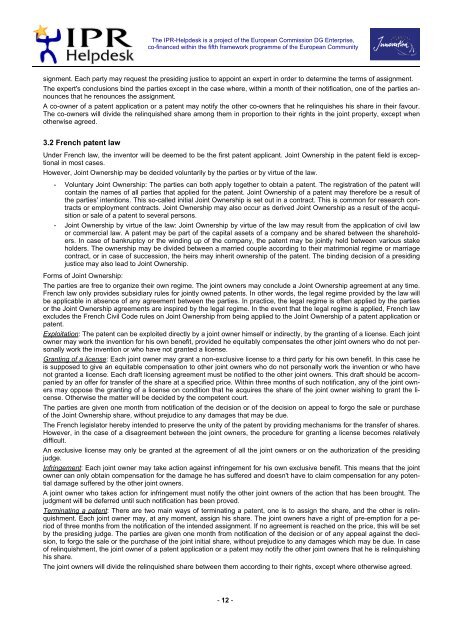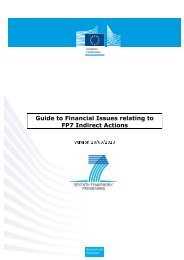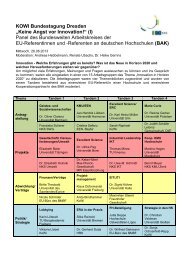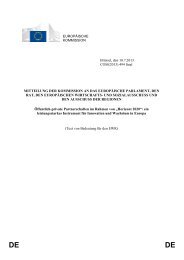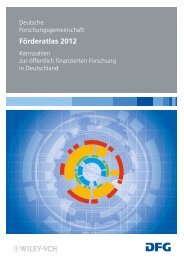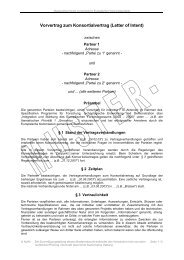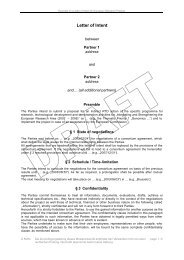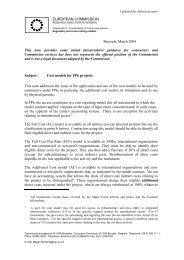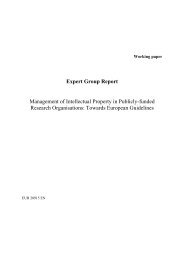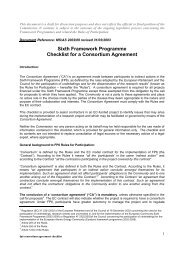Joint Ownership in Intellectual Property Rights - KoWi
Joint Ownership in Intellectual Property Rights - KoWi
Joint Ownership in Intellectual Property Rights - KoWi
You also want an ePaper? Increase the reach of your titles
YUMPU automatically turns print PDFs into web optimized ePapers that Google loves.
The IPR-Helpdesk is a project of the European Commission DG Enterprise,<br />
co-f<strong>in</strong>anced with<strong>in</strong> the fifth framework programme of the European Community<br />
signment. Each party may request the presid<strong>in</strong>g justice to appo<strong>in</strong>t an expert <strong>in</strong> order to determ<strong>in</strong>e the terms of assignment.<br />
The expert's conclusions b<strong>in</strong>d the parties except <strong>in</strong> the case where, with<strong>in</strong> a month of their notification, one of the parties announces<br />
that he renounces the assignment.<br />
A co-owner of a patent application or a patent may notify the other co-owners that he rel<strong>in</strong>quishes his share <strong>in</strong> their favour.<br />
The co-owners will divide the rel<strong>in</strong>quished share among them <strong>in</strong> proportion to their rights <strong>in</strong> the jo<strong>in</strong>t property, except when<br />
otherwise agreed.<br />
3.2 French patent law<br />
Under French law, the <strong>in</strong>ventor will be deemed to be the first patent applicant. <strong>Jo<strong>in</strong>t</strong> <strong>Ownership</strong> <strong>in</strong> the patent field is exceptional<br />
<strong>in</strong> most cases.<br />
However, <strong>Jo<strong>in</strong>t</strong> <strong>Ownership</strong> may be decided voluntarily by the parties or by virtue of the law.<br />
- Voluntary <strong>Jo<strong>in</strong>t</strong> <strong>Ownership</strong>: The parties can both apply together to obta<strong>in</strong> a patent. The registration of the patent will<br />
conta<strong>in</strong> the names of all parties that applied for the patent. <strong>Jo<strong>in</strong>t</strong> <strong>Ownership</strong> of a patent may therefore be a result of<br />
the parties' <strong>in</strong>tentions. This so-called <strong>in</strong>itial <strong>Jo<strong>in</strong>t</strong> <strong>Ownership</strong> is set out <strong>in</strong> a contract. This is common for research contracts<br />
or employment contracts. <strong>Jo<strong>in</strong>t</strong> <strong>Ownership</strong> may also occur as derived <strong>Jo<strong>in</strong>t</strong> <strong>Ownership</strong> as a result of the acquisition<br />
or sale of a patent to several persons.<br />
- <strong>Jo<strong>in</strong>t</strong> <strong>Ownership</strong> by virtue of the law: <strong>Jo<strong>in</strong>t</strong> <strong>Ownership</strong> by virtue of the law may result from the application of civil law<br />
or commercial law. A patent may be part of the capital assets of a company and be shared between the shareholders.<br />
In case of bankruptcy or the w<strong>in</strong>d<strong>in</strong>g up of the company, the patent may be jo<strong>in</strong>tly held between various stake<br />
holders. The ownership may be divided between a married couple accord<strong>in</strong>g to their matrimonial regime or marriage<br />
contract, or <strong>in</strong> case of succession, the heirs may <strong>in</strong>herit ownership of the patent. The b<strong>in</strong>d<strong>in</strong>g decision of a presid<strong>in</strong>g<br />
justice may also lead to <strong>Jo<strong>in</strong>t</strong> <strong>Ownership</strong>.<br />
Forms of <strong>Jo<strong>in</strong>t</strong> <strong>Ownership</strong>:<br />
The parties are free to organize their own regime. The jo<strong>in</strong>t owners may conclude a <strong>Jo<strong>in</strong>t</strong> <strong>Ownership</strong> agreement at any time.<br />
French law only provides subsidiary rules for jo<strong>in</strong>tly owned patents. In other words, the legal regime provided by the law will<br />
be applicable <strong>in</strong> absence of any agreement between the parties. In practice, the legal regime is often applied by the parties<br />
or the <strong>Jo<strong>in</strong>t</strong> <strong>Ownership</strong> agreements are <strong>in</strong>spired by the legal regime. In the event that the legal regime is applied, French law<br />
excludes the French Civil Code rules on <strong>Jo<strong>in</strong>t</strong> <strong>Ownership</strong> from be<strong>in</strong>g applied to the <strong>Jo<strong>in</strong>t</strong> <strong>Ownership</strong> of a patent application or<br />
patent.<br />
Exploitation: The patent can be exploited directly by a jo<strong>in</strong>t owner himself or <strong>in</strong>directly, by the grant<strong>in</strong>g of a license. Each jo<strong>in</strong>t<br />
owner may work the <strong>in</strong>vention for his own benefit, provided he equitably compensates the other jo<strong>in</strong>t owners who do not personally<br />
work the <strong>in</strong>vention or who have not granted a license.<br />
Grant<strong>in</strong>g of a license: Each jo<strong>in</strong>t owner may grant a non-exclusive license to a third party for his own benefit. In this case he<br />
is supposed to give an equitable compensation to other jo<strong>in</strong>t owners who do not personally work the <strong>in</strong>vention or who have<br />
not granted a license. Each draft licens<strong>in</strong>g agreement must be notified to the other jo<strong>in</strong>t owners. This draft should be accompanied<br />
by an offer for transfer of the share at a specified price. With<strong>in</strong> three months of such notification, any of the jo<strong>in</strong>t owners<br />
may oppose the grant<strong>in</strong>g of a license on condition that he acquires the share of the jo<strong>in</strong>t owner wish<strong>in</strong>g to grant the license.<br />
Otherwise the matter will be decided by the competent court.<br />
The parties are given one month from notification of the decision or of the decision on appeal to forgo the sale or purchase<br />
of the <strong>Jo<strong>in</strong>t</strong> <strong>Ownership</strong> share, without prejudice to any damages that may be due.<br />
The French legislator hereby <strong>in</strong>tended to preserve the unity of the patent by provid<strong>in</strong>g mechanisms for the transfer of shares.<br />
However, <strong>in</strong> the case of a disagreement between the jo<strong>in</strong>t owners, the procedure for grant<strong>in</strong>g a license becomes relatively<br />
difficult.<br />
An exclusive license may only be granted at the agreement of all the jo<strong>in</strong>t owners or on the authorization of the presid<strong>in</strong>g<br />
judge.<br />
Infr<strong>in</strong>gement: Each jo<strong>in</strong>t owner may take action aga<strong>in</strong>st <strong>in</strong>fr<strong>in</strong>gement for his own exclusive benefit. This means that the jo<strong>in</strong>t<br />
owner can only obta<strong>in</strong> compensation for the damage he has suffered and doesn't have to claim compensation for any potential<br />
damage suffered by the other jo<strong>in</strong>t owners.<br />
A jo<strong>in</strong>t owner who takes action for <strong>in</strong>fr<strong>in</strong>gement must notify the other jo<strong>in</strong>t owners of the action that has been brought. The<br />
judgment will be deferred until such notification has been proved.<br />
Term<strong>in</strong>at<strong>in</strong>g a patent: There are two ma<strong>in</strong> ways of term<strong>in</strong>at<strong>in</strong>g a patent, one is to assign the share, and the other is rel<strong>in</strong>quishment.<br />
Each jo<strong>in</strong>t owner may, at any moment, assign his share. The jo<strong>in</strong>t owners have a right of pre-emption for a period<br />
of three months from the notification of the <strong>in</strong>tended assignment. If no agreement is reached on the price, this will be set<br />
by the presid<strong>in</strong>g judge. The parties are given one month from notification of the decision or of any appeal aga<strong>in</strong>st the decision,<br />
to forgo the sale or the purchase of the jo<strong>in</strong>t <strong>in</strong>itial share, without prejudice to any damages which may be due. In case<br />
of rel<strong>in</strong>quishment, the jo<strong>in</strong>t owner of a patent application or a patent may notify the other jo<strong>in</strong>t owners that he is rel<strong>in</strong>quish<strong>in</strong>g<br />
his share.<br />
The jo<strong>in</strong>t owners will divide the rel<strong>in</strong>quished share between them accord<strong>in</strong>g to their rights, except where otherwise agreed.<br />
- 12 -


